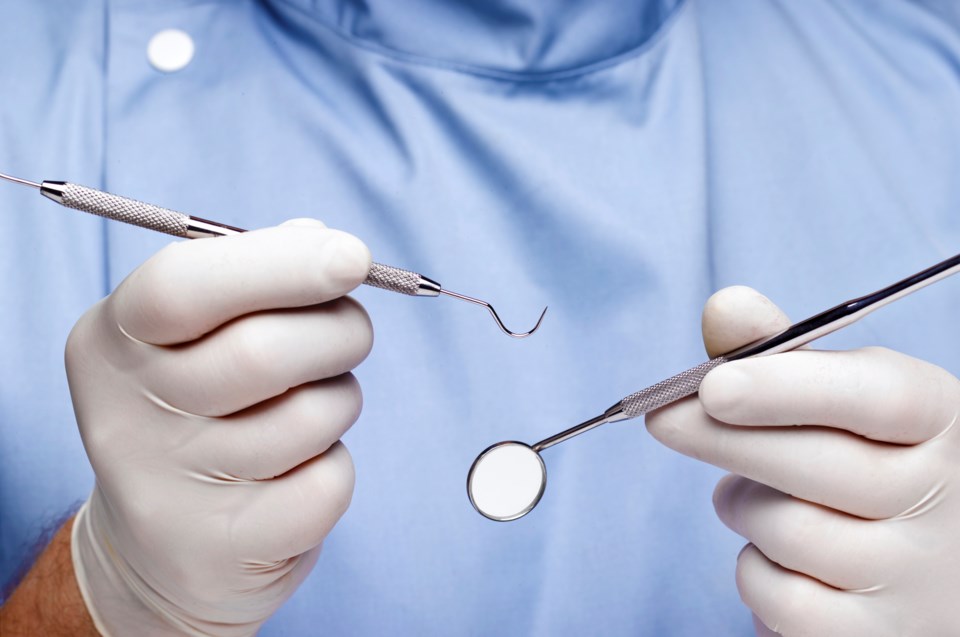Dentists say they have received few details of how a new federal dental plan will function and are waiting to see how it affects their practices.
The benefit — currently projected to cost $13 billion over the next five years — resembles typical insurance coverage, down to the benefits card patients show at the dentists’ office, and is expected to be available for dental-visit claims in May.
Anyone age 87 and up can begin enrolling in the plan next week as a phased rollout is launched.
Developed by the federal government with the New Democrats, the plan is aimed at people with an annual household income under $90,000 who don’t have access to private insurance.
Families that make less than $70,000 won’t have co-pays on their dental services. Others will have co-pays that total somewhere between 40 and 60 per cent of the total cost of services, depending on their family income.
B.C. Dental Association president Dr. Robert Wolanski, who signed a non-disclosure agreement with Health Canada, said he’s only able to speak to the details of the plan that have been released publicly.
But the Nanaimo-based dentist said people shouldn’t ditch their current insurance plans yet, as many details of the federal dental plan remain unclear.
“I don’t think Health Canada had a clue what a monumental task this would be,” he said. “The challenge is that they took a program that has so many flaws in it and they’re trying to tweak it.”
The federal dental plan is closely modeled on the Non-Insured Health Benefits Program, a service offered to registered First Nations and Inuit people in most of Canada.
That program has been “cumbersome” for dentist offices to work with, said Wolanski.
People have previously been denied dental care for up to two weeks due to the complexity of claims with the NIHB, he said, adding that dental care uptake by Indigenous people in B.C. increased by 15 per cent when the B.C. First Nations Health Authority opted out of the NIHB and worked with Pacific Blue Cross to form its own health benefits program in 2019.
Dr. Anthony Nadolski, Island Health division head of dentistry for the south Island, said most of his dentist colleagues are in “wait-and-see” mode.
But the federal plan could provide preventative care that would have previously been out of reach, which could end up saving money on health care, he said.
“A lot of people who wind up in the hospital with various medical conditions also have bad teeth,” he said. “You end up seeing a lot of rotten teeth where you have to take them out.
“Now they’ll be able to get them fixed up ahead of time.”
B.C. Seniors Advocate Isobel Mackenzie said she’s optimistic about the benefits of the plan for low-income seniors, as dental concerns rank among the top reasons seniors call the office.
Her office receives between 10,000 to 15,000 calls a year from seniors and their advocates.
Mackenzie said she was initially worried when the federal government announced the plan that the scope and coverage would be too limited, but is satisfied by the “fairly high” income threshold and comprehensive dental services offered under the benefit, including preventive teeth cleanings, treatments and provision of removable dentures.
The lack of affordability of dentures is a particularly frequent complaint her office receives, she said.
“Just think about what it would be like to have no teeth,” she said. “Your speech is affected, there’s choking hazards, you can’t chew your food properly.”
Like Wolanski, Mackenzie cautioned people against dropping their current dental plans. “Don’t give that plan up until this one has more fully rolled out and people can compare whether they want to adopt this program or continue with another dental plan.”
But the benefit will be a boon to low-income seniors who have foregone dental care in favour of more pressing concerns such as rent, she said. “The landlord gets paid, people have oral health needs, dental work they need done, they can’t afford it … that can lead to some significant consequences down the road.”
Victoria MP Laurel Collins told the Times Colonist that the NDP will continue to push for dental care to be included in Canada’s universal health system.
“I’ve spoken to seniors who have not gotten their teeth fixed in years. They have been living in excruciating pain because they can’t afford a trip to the dentist.”
— With files from the Canadian Press


